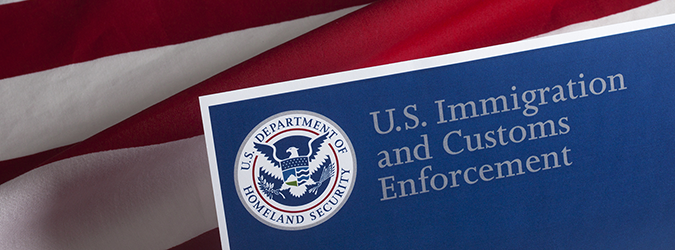Know What To Do if Immigration Enforcement Comes for Your Clients
3.31.2025

The New York State Bar Association is helping attorneys who may need to represent clients who are not citizens in the midst of a rapidly-changing legal landscape.
More than 500 people attended a NYSBA Continuing Legal Education course on March 28 to learn more about the topic and President Trump’s priorities for enforcement of immigration orders.
More Immigration Enforcement Means More Arrests and Deportations
The federal government is allowed to arrest and deport foreign nationals at its discretion. The president usually decides who will be prioritized for removal, including people deemed a threat to national security or public safety, people who entered the country unlawfully, and people with already existing orders for their removal.
“Generally speaking, every presidential administration sets up a priority system,” said Robert Horne, managing attorney at the Regional Immigration Assistance Center of the Hudson Valley. “President Obama had a priority system. Even President Trump, in his first term, had a priority system – a quite general one. President Biden had a priority system. And now we’re in a situation entirely different with the new Trump administration.”
Horne explained that President Trump has not set up such a system. He has issued several executive orders regarding immigration enforcement, leaving it to the U.S. Immigration and Customs Enforcement, also known as ICE, to implement these new policies.
During previous administrations, ICE had a policy of not entering sensitive locations, such as hospitals, schools, places of worship, and courts. That policy was rescinded on Jan. 21.
“Here in New York we have the Protect Our Courts Act, which prohibits civil immigration enforcement in or around our courthouses,” Horne said. “So we do have that protection thus far. Except for a couple of limited examples, they’ve been adhering to that. We haven’t seen ICE in our courthouses, which is good, because a mid-case arrest really disrupts the entire criminal justice system, in my opinion.”
However, the U.S. Department of Justice is suing New York State and Illinois, arguing that federal law supersedes state sanctuary laws and policies.
Have a Plan in Case Immigration Enforcement Comes
The panelists also advised nonprofits to have a plan in place about how they will respond to an immigration enforcement action on their premises, and to make sure their clients and staff are protected.
“Another consideration is that you should have a designated person, preferably a supervisor, or someone with some sort of authority within the nonprofit entity, who can make decisions about what should happen,” said Sophie Feal, managing attorney at the Legal Aid Bureau Buffalo Holistic Representation Program. “You don’t want to have the frontline person – the secretary, if you will – engaging in a conversation with ICE officers who are there to make arrests. There should be someone that frontline person can turn to and say, ‘I am not authorized to let you in. I am not authorized to review the warrant you may have. I need to call so-and-so.’”
The panelists emphasized that while bystanders can document the actions of immigration enforcement officers and inform detainees of their rights to counsel and to remain silent, they should not interfere with an arrest, because that could put everyone in danger.
The panelists also said that noncitizen clients should be advised to carry their paperwork, such as a green card and other proof of their residence in the United States, at all times. If a person is stopped by ICE, they should first ask, “Am I free to go?” and leave if allowed to do so.
Regarding the recent arrests of foreign students, Horne said that while people have the right to protest and express their opinions, it is important for everyone in a protest to stay within the law.
“You just can’t cross the line into harassing, threatening behavior or assaultive behavior,” he said. “And there have been some instances of that. We’ve seen it on TV. So I would stick to the protest and expression of your opinion, rather than crossing the line into any potential criminal behavior. And if you’re with a group of people who are protesting, you want to be aware of what the people with you are doing as well.”
The program was sponsored by the New York State Bar Association’s International Section and its Committee on Immigration Representation. View the full seminar here.





